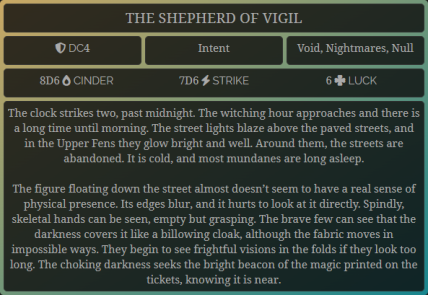Encounters
Just like the PCs, NPCs have a native set of stats, Cinder, Strike, Keywords, and all. Using these, characters are able to encounter supernatural creatures and test their skills against them, in and outside of combat. A player can decide at any time that they want to include an Encounter in an active thread. Such encounters are only lightly moderated.
After you drop a Encounter request in our Monster Encounter moderation thread using the provided template, staff will drop an encounter by rolling on our extensive Encounter table based on each location (or event). These will all be encounters, ranging from friendly to hostile, mundane to mythical. A player can also set up a planned Encounter, which simply means they choose what manner of creature they want to encounter.
Staff will provide stats such as the type, dice, Luck, DC, Intent, and other pertinent information. The player is then empowered to roll for the monster according to the provided stats, rolling against their DC and taking down their Luck in order to win, lose, or run from the encounter.
How To: Encounters[edit]
In the Encounter, the monster, item, or scenario is always "attacking" or "taking action" according to the provided Intent. For example, a 'friendly' succubus will be using their Cinder dice to seduce and feed on a PC, while a 'hostile' succubus would be attacking, in order to do the same.
After being given the stats, you are free to interpret how the scenario goes, running the encounter according to the below cycle of actions. The cycle is once per post, and repeated in each post actively participating
- Roll an attack/interaction with your character's chosen dice pool. Refer to the Dice Pool for more information.
- Roll the Encounter's attack/interaction. This will usually be their strongest pool, but if flavour allows or their primary pool is blocked (such as a 'Null' power preventing them from using Cinder), the weaker pool can be used. See the Encounter Card for more information on how an Encounter would act.
- Reduce the Luck tally based on the results of the rolls. This will target the DC of the Encounter. By default, the Encounter will target the Luck of the character rolling its attack/interaction. Flavour, player discussion, or another mechanical factor can change this.
- "Call" and track the rolls in your post. Refer to the Help: Dice Tracking for advice on how to track your roll.
There are no "rounds" in a combat Encounter, but the Encounter must roll when a player rolls against them. If the player chooses to not roll in the name of flavour, the Encounter does not have to roll. Players cannot drain (or lose!) more than 1 Luck (or 2 in the case of a Critical Hit) in a single post.
Flavour can provide a means for players to escape a rough fight or drag wounded companions away out of danger, they do not always have to reduce the Encounters Luck to zero to get away. The Encounters can end with the characters fleeing or even the Encounter running away, if the players roll well enough to justify it (or the Encounter rolls badly enough!). The exception is in Event threads, these Encounters will have their own rules or require the Luck to be whittled down properly to nil.
Social Encounters[edit]
Social Encounters are a brand of Encounter that still get dice pools and Luck, but isn't necessarily something you need to fight or even acts hostile. As mentioned earlier, you could encounter either a friendly or a hostile succubus, how you interact with it will continue the scene and the Encounter. As a result, a Social Encounter functions a little differently from a Combat Encounter. You still roll, but a "Successful" interaction is based on a social interactive flavour. Some Social Encounters could turn hostile with enough "failed" rolls or hostile actions.
Like Combat Encounters, Social Encounters follow the flavours players give it. If a player decides to do a hostile move, the friendly Encounter will turn hostile. If a player decides to have their failed rolls be horrible social faux pas or spilling their drink, the friendly Encounter could turn hostile.
Keep in mind that any Social Encounter progress, such as Luck lost by those involved, will reset on it becoming a Combat Encounter.
Homebrew Encounters?[edit]
Some players might find themselves wanting to play with the dice in a PVE context, but not necessarily want to involve a formally requested Encounter. Here, players can play around with how they use the dice, establish rules for different games between the characters. Whether it is a foot race, a chase, hide and seek, other tests of skill or mettle, players have the freedom to construct their own rules on how to use the dice, using their existing dice pools.
As always, communication with your thread partner is key. Always make sure you agree on the framing of the competition or test of skill and that you make sure it remains compelling for everyone involved. These types of more playful uses of the dice system do not count in Advancement as an Encounter, but can apply as a test of skill or challenge.
Track Your Rolls![edit]
In Encounters and combat, tracking your roll results and ability uses is important for both the other player and your own records. If you want to use any thread for Advancing your character, you will also have to keep track of your rolls and the abilities used. Help:Dice Tracking has all the information you need for tracking your dice.
Requesting an Encounter[edit]
Once you have decided to go for a random Encounter or have set up your planned Encounter, you can request that an Encounter table be generated by posting the provided form in the Moderation Request Thread.
Include what type of request (Random/Planned Encounter), who is involved, where it is happening, the link to the thread, and a summary of the thread events, such as weather, time of day, the specific creature if it is a planned Encounter, and other relevant information.
[b]Request Type:[/b] Random or specific monster. If specific, provide a brief description and a name.[b]Characters Involved:[/b] Which characters are involved. [b]Characters' Reputations:[/b] The rank of reputation each character in the thread has, as this will affect the type of encounter. [b]Location:[/b] Which forum is it taking place in. [b]Link:[/b] Link to the thread. [b]Thread/Post TL;DR:[/b] Include the time of day and specific location (inside/outside) and any other relevant information.
Encounter Card[edit]

An Encounter Card is what staff will drop in your thread once an Encounter has been requested. The card will include all the pertinent information for rolling as and defending against the Encounter. The information provided will be their Strike & Cinder dice pools, which the largest one being their favoured pool, their Defence Class, their intent (hostile/neutral/friendly), Luck, their Keywords, and a description of the Encounter.
The Encounter card is what players use to steer the Encounter. Their Keywords define what the Encounter can do, defining their magic much like it does for the characters on the board. The Encounter's dice pools highlight what tactics they favour, as someone or something with a higher cinder pool would use magic for the most part, while someone with a higher strike would do more physical things. The 'intent' also indicates whether those actions will be in the form of attacks, luring, or social.
As always in a situation where the players control the generated Encounter, it is on a honour system that they will take the stats provided seriously. Always taking the lower dice pool is ignoring the framing provided and 'making it easy' for oneself, and thus being dishonest in the system. However, if a player has blocked off the strongest pool, either mechanically through something like Null or made successful Cinder rolls to restrain a more physical character, it is only natural that the Encounter use the lower pool.
PVP Encounters[edit]
While the Monster Encounters are the bread and butter of Three's dice system, there is also room for players to use the Strike & Cinder system versus each other.
Rolling in a PVP situation goes the same as any other, but there's a careful balance of communication and allowing for the defending player to interpret the hits themselves. Remember, Luck is not HP, so a "hit" is not necessarily a physical blow or injury even if it reduces their Luck. The end of the fight does not need to be when Luck runs out, players can decide to yield or flee.
PVP encounters can count towards advancement, but it must then fully engage the dice system on each post. These PVP encounters can be friendly fights, hostile run-ins, or just sparring for practice. Like anything relating to writing collaboratively, we remind everyone to maintain clear communication and if there is confusion to talk to your partner.
[edit]
| General Information | Forum Guidelines ⁂ Discord Guidelines ⁂ At-a-Glance ⁂ FAQ ⁂ Style Guide ⁂ Custom Codes |
|---|---|
| Character Creation | Creation Guide ⁂ Paths ⁂ Mundanes ⁂ Arcanists ⁂ Cursed ⁂ Possessed ⁂ Half-Bloods ⁂ Shifters ⁂ Undying ⁂ Spirits ⁂ Face Claims ⁂ Character Census |
| Magic Information | Magic Summary ⁂ Archetypes ⁂ Wards and Protective Materials ⁂ Codes of Conduct ⁂ Rituals ⁂ Enchantments ⁂ Keywords |
| Setting Information | General Setting ⁂ Easthaven ⁂ City Map ⁂ Owning Locations ⁂ The Exchange ⁂ Existing Groups ⁂ Events Timeline ⁂ Beyond Easthaven |
| Game Mechanics | Strike & Cinder Dice ⁂ Dice Pool ⁂ Dice Mechanics ⁂ Difficulty Class ⁂ Success Range ⁂ Encounters ⁂ Advancement ⁂ Reputation |
| Site Information | Credits ⁂ Help:Archive ⁂ Help:Dice Tracking ⁂ Help:Dice Rolling ⁂ Help:Forum Templates |
